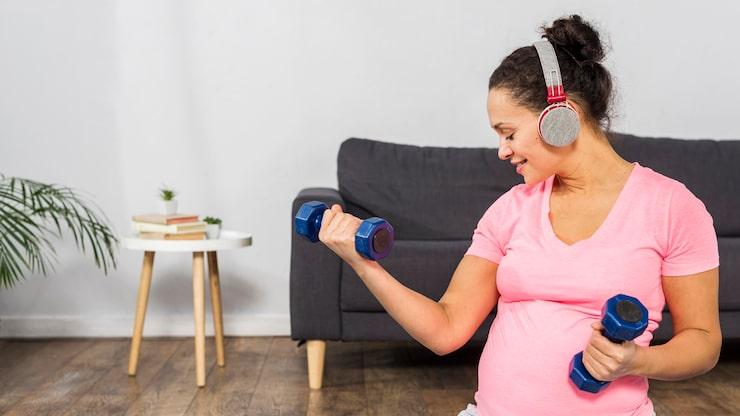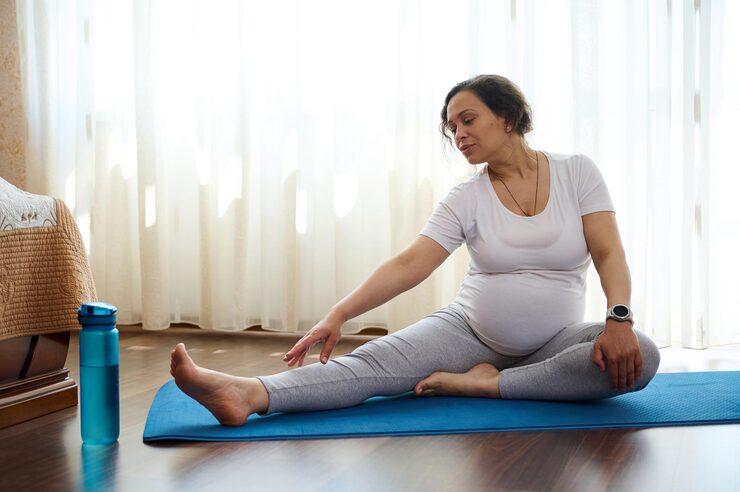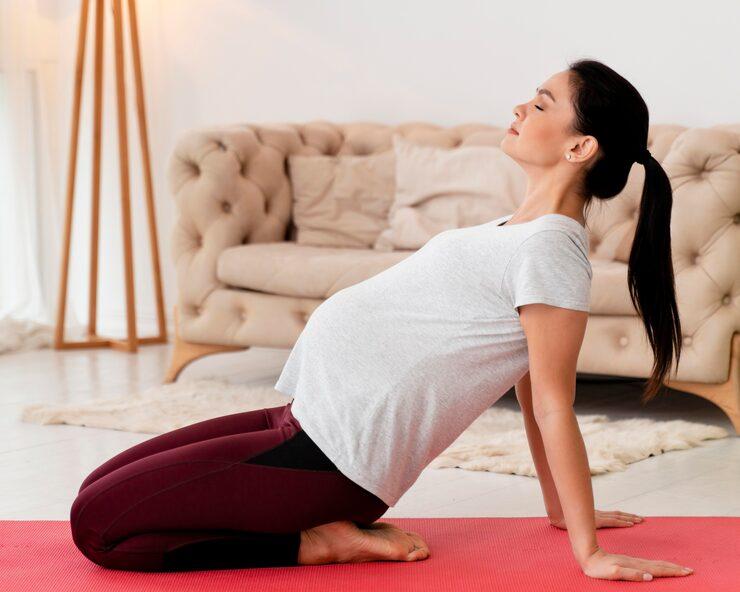Safe Exercises for Pregnant Women
Pregnant women using light weights to exercise
Pregnancy alters a lot. Many women wonder how to be active and healthy as their bodies adjust to supporting a new life without compromising their own or their baby's health. The good news is that for most simple pregnancies, exercise is safe and even helpful. Regular exercise can provide you with more energy, improve your overall well-being, boost your mood, and even prepare your body for childbirth.
That being said, you shouldn't push yourself too hard or start doing particularly intense workouts when you're pregnant. Select routines that are safe and low-impact, and pay attention to what your body is telling you. This blog discusses the benefits of exercising while pregnant, the guidelines to follow, and a list of safe workouts that pregnant women can engage in.
The benefits of exercising when pregnant
- There are many reasons why doctors and fitness experts believe that pregnant women should stay active:
- Boosts energy levels: Exercise helps you combat weariness and improve blood circulation.
- Gentle exercise can help alleviate back pain, bloating, constipation, and swelling, making pregnancy more comfortable.
- Exercise helps both the mother and baby grow at a healthy rate, enabling them to gain weight in a balanced manner.
- Strengthening the core and pelvic floor reduces stress on the spine, leading to improved posture and muscle tone.
- Exercise releases endorphins that help with stress, anxiety, and sadness. This makes you feel better and sleep better.
- Aerobic fitness and stronger muscles make the body more ready for work by giving it more endurance and maybe making it easier.
- Helps women recover better and faster: Active Women often regain their strength more quickly after having a baby.
Basic Safety Rules
pregnant woman exercising safely
Before starting or continuing an exercise routine while pregnant, it's important to follow some basic safety regulations.
- Consult your doctor, as every pregnancy is unique. Based on your medical history and current condition, a doctor can tell you what's safe.
- To stay hydrated, drink water before, during, and after your workouts.
- Don't get too hot: Wear clothes that allow air to flow, work out in cool settings, and avoid saunas and hot yoga.
- Gentle stretching before and after working out helps minimize the risk of injury.
- If you feel pain, dizziness, tightness in your chest, or bleeding from your vagina, stop straight away.
- Don't lie flat on your back after the first three months. This can make it harder for blood to reach the uterus.
- Change the intensity: Aim for moderate activity that raises your heart rate but doesn't make it hard for you to talk (the "talk test").
Safe exercises for pregnant women
1. Walking
- Walking is one of the safest and easiest ways to stay in shape.
- Why it's good: It doesn't do much to the body, but it keeps it moving and strengthens the heart without placing stress on the joints.
- How to do it: Most days of the week, try to do it for 20 to 30 minutes. Choose flat surfaces and wear shoes that help you.
2. Swimming and aerobics in the water
- It is crucial to avoid activities in water while pregnant.
- What makes it good: Water helps the body maintain its weight, which takes stress off the joints and prevents the body from overheating.
- You can swim laps, do water aerobics when pregnant, or just wander in the shallow end. Avoid aquatic sports like diving, which can be taxing on your body.
3. Yoga for women who are pregnant
- Yoga helps people calm down, become more flexible, and rediscover their center.
- Why it's good: Helps with breathing exercises that are useful during childbirth, strengthens muscles, and relaxes you.
- To do it, consider taking a prenatal yoga class or viewing videos specifically designed for pregnant women. Avoid practicing hot yoga, deep twists, or lying on your stomach.
4. Riding a bike in place
- Using a stationary bike to work out your heart is safe.
- Why it's good: Not too demanding on the body, and you can easily modify the level of difficulty.
- To do it properly, ensure your chair is at the correct height and that you are sitting up straight. Avoid riding your bike outside every day while you're pregnant, as it can make it harder for you to maintain your balance.
5. Aerobics with limited effect
- Pregnant women can engage in safe aerobic exercises that are beneficial for their cardiovascular health and overall well-being.
- Why it's good: It gives you more energy, helps you stay coordinated, and lets you continue longer.
- Choose lessons labeled "prenatal" or follow along with gentle online sessions. Don't jump too high or move too quickly.
6. Strength training (with adjustments)
- You may maintain your muscles strong by utilizing modest weights or resistance bands.
- Why it's a good thing: It strengthens your arms, legs, and core so they can better handle the weight of pregnancy.
- To achieve this, use lighter weights, perform more reps, and move in a controlled manner. Don't hold your breath (Valsalva maneuver).
7. Kegel exercises for the pelvic floor
- It's especially crucial to strengthen the pelvic floor after giving birth.
- Why it's good: It stops urine incontinence, makes the uterus stronger, and helps you heal after giving birth.
- To accomplish this, squeeze your pelvic floor muscles as if trying to stop the flow of urine, hold for five seconds, and then release. Do this a few times a day, 10 to 15 times a day.
8. Stretching and flexibility exercises
- Stretching can help alleviate the stiffness that often accompanies pregnancy.
- What makes it good: Helps relax the back, hips, and legs.
- How to do it: Incorporate gentle stretches into your daily routine. Don't stretch too much, as pregnant hormones can make your joints more flexible.
Things you shouldn't do when you're pregnant
Not everything is safe for pregnant women to do. It's recommended not to:
- Sports with a lot of contact, like soccer, basketball, and martial arts
- Things that could make you fall, like skiing, horseback riding, and gymnastics
- Workouts that are very hard and make you tired
- Exercises that make you hold your breath or strain
- Hot yoga and scuba diving
Exercise by Trimester
Pregnant woman in third trimester stretching
Weeks 1–12 of the First Trimester
- If you are already active, stick to your normal routine, but avoid overexertion.
- Walking, swimming, or light strength training can help you build endurance.
Weeks 13–27 of the second trimester
- You might have trouble with balance, so choose safer activities like stationary cycling instead.
- Good options are prenatal yoga and adapted aerobics sessions.
Third Trimester (28–40 Weeks)
- Put comfort and relaxation first.
- Walking, light stretching, and pelvic floor exercises are the best.
- Pay attention to your body and don't get too tired.
Benefits for mental and emotional health
Exercise when pregnant isn't simply good for your body. It also:
- Lowers anxiety and despair by releasing hormones that make you feel wonderful.
- Gives you more confidence in handling labor and delivery.
- When you take prenatal classes with other pregnant women, you get support from your community.
Questions and Answers About Working Out While Pregnant
1. Is it safe to start working out if I wasn't active before I got pregnant?
Yes, but take it easy at first. Start with gentle walking or stretching, and then gradually increase the intensity. Always talk to your doctor first.
2. How often should I work out when I'm pregnant?
Most experts recommend engaging in moderate exercise for 150 minutes a week, spread out over several days.
3. Can working out hurt my baby?
No, moderate activity is safe for most healthy pregnancies. You should avoid overexertion, excessive heat, and hazardous activities.
4. What are some signals that you should quit working out?
If you feel dizzy, have chest discomfort, vaginal bleeding, severe cramps, or fluid leaking, stop right once. Get medical help right away.
5. Can working out make labor easier?
Yes. Regular exercise can help you have smoother labor and recover faster by making you more flexible, stronger, and able to last longer.
There are several benefits to exercising while pregnant, both for the mother and the baby.




